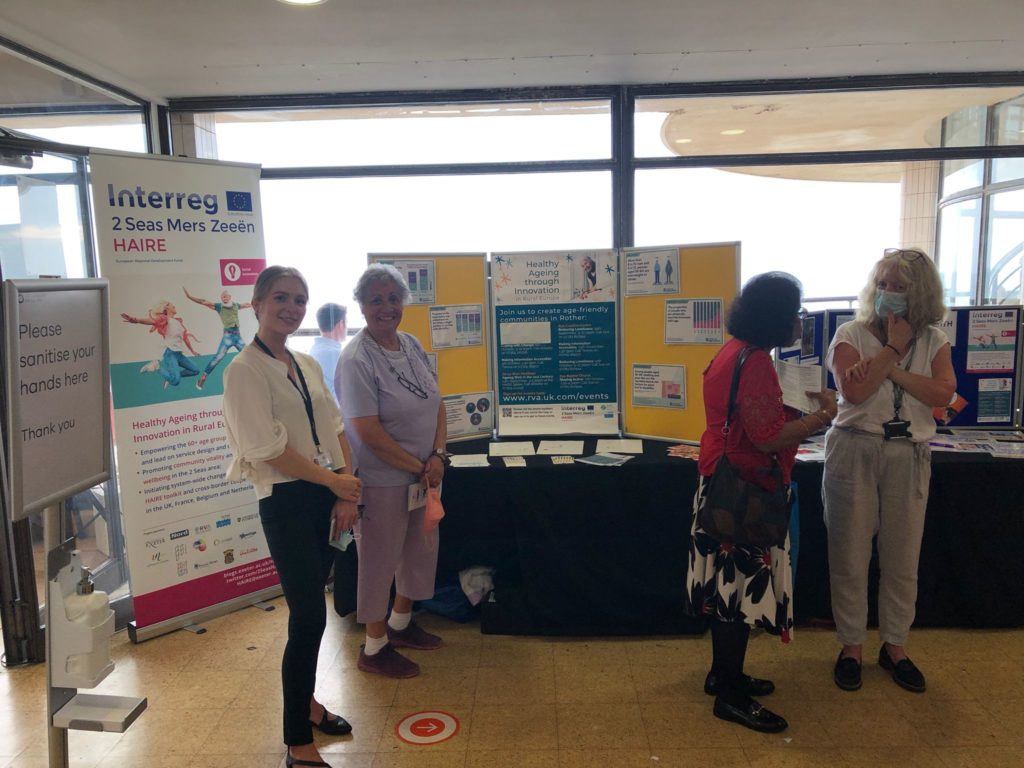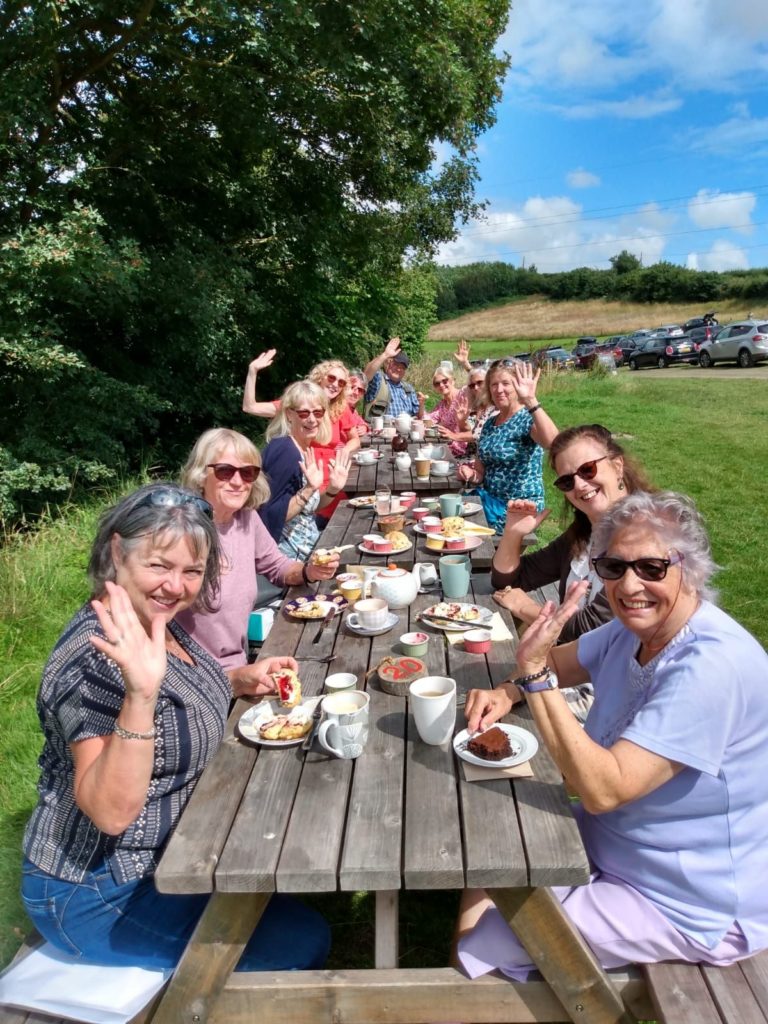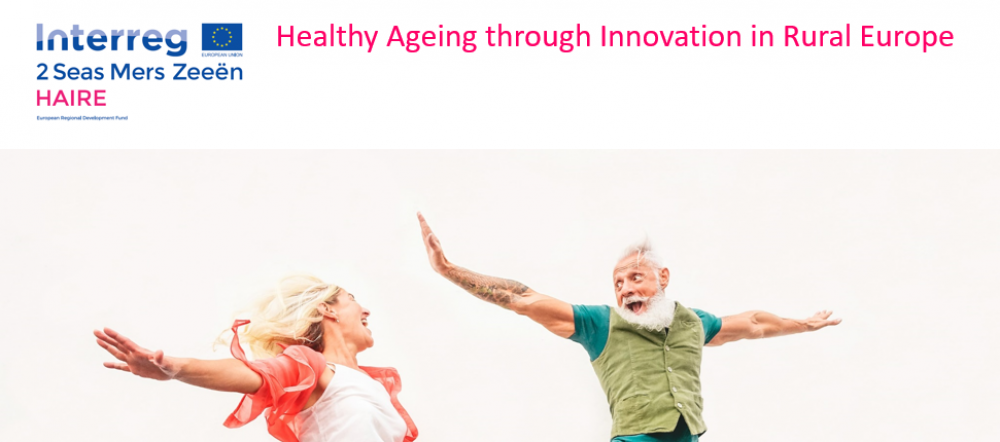
The Rother (East Sussex, UK) Voluntary Association AGM took place on 19th October 2021 and included the first RVA Volunteer Award ceremony. The award for Outstanding Volunteers was presented by The Lord Lieutenant of East Sussex, Mr Andrew Blackman, and received on behalf of the team by volunteer Hans and Councillor Sue Prochak. The nomination for the award is printed below as it sums up beautifully the work of the volunteers. It was written by Steve Broome, HAIRE Project Manager, Policy & Strategic Development Team, Adult Social Care and Health at ESCC.
The Healthy Ageing and Innovation in Rural Europe (HAIRE) project is an Interreg-funded initiative led by the University of Exeter that works with a wide range of partners across England, France, Belgium, and the Netherlands. At the centre of the project is the importance of understanding the lived experience of ageing in multiple ways – in terms of physical health, mental and emotional wellbeing, loneliness, social relationships, connections to local organisations and services, transport, finances, and what people perceive their future might hold.
In 2020, just as the pandemic was beginning, the HAIRE project began advertising for volunteers who cared about the above issues in their Rye or Robertsbridge communities. Even in the midst of the challenges brought about by Covid, the HAIRE project was very lucky and grateful to have received interest from such an individually and collectively talented group of local people. The volunteers brought a range of professional experiences relevant to healthy ageing, and rich personal experiences of local community life and issues connected to ageing and wellbeing. All our volunteers live in the Rother area, and many have numerous voluntary and activist roles in their communities to improve wellbeing and community life in a diversity of ways.
The HAIRE volunteer team have supported the project for some 16 months and counting. The task of volunteers has been wide and complex and required flexibility. Firstly, they undertook multiple training sessions that covered: healthy ageing theories, data, and attitudes; reflection on their own attitudes and experiences of ageing; active listening and interviewing skills; safeguarding; loneliness and mental wellbeing; understanding social networks; and action planning.
Following the training, volunteers had to put all these skills and knowledge together in conducting Guided Conversations with people aged 60+ who lived in the Rye and Robertsbridge areas. These conversations were very wide ranging, covering all the aspects of healthy ageing described above, and typically lasted 2-3 hours each. They required volunteers to build rapport and trust with others and be able to support and empathise with difficult experiences and topics, while also recording relevant information in written notes. The team have completed more than 200 hours of guided conversations, and are now repeating the exercise in going back to our 80 or so participants and seeing how things have changed for them six months on.

Beyond this, the volunteers have formed local steering groups in each of our pilot sites, meeting regularly to help guide the project, interpret data, make strategic decisions and co-produce community events. Most recently, they have helped to design and deliver events in the community with a wide range of resident and organisational stakeholders, which have resulted in innovative ideas to take forward over the remaining 18 months of HAIRE.
The volunteers have managed to do all this in the context of the COVID-19 pandemic. This has meant having to adapt to digital ways of working, despite many volunteers not having a high degree of familiarity with the technologies we have needed to use to run many aspects of the project virtually.
To date, the HAIRE project has engaged approximately 80 local people aged 60+ and taken the time to understand their experience and situation, to reflect on it, and help identify actions and sources of support that can improve their lives and age well in place. Volunteers have helped to identify the most important themes around healthy ageing in their communities and have been a key part in designing social innovations that will meet the challenges and opportunities of ageing faced by local people.
Throughout their volunteering, they have been very generous with their time, ideas, passions and personal experience. Not only has this been key to growing a team (rather than a set of individual volunteers) and to supporting each other in the multiple and challenging tasks they have undertaken, it has directly expressed the values of the HAIRE project in a way that has been ‘socially contagious’ – because they have been passionate, committed, open, kind, and generous, others have responded similarly and felt included in the project. They have set, and continue to set, the tone of the project in a way that makes more ambitious, transformative change possible.
The project, and everything that will stem from and be influenced by it, would not have been possible without the individual and collective contributions of the HAIRE volunteers. The wide range of people involved in the HAIRE project in East Sussex and beyond are extremely grateful for their involvement in the HAIRE project and look forward to continuing to improve the lives of local people with them.

